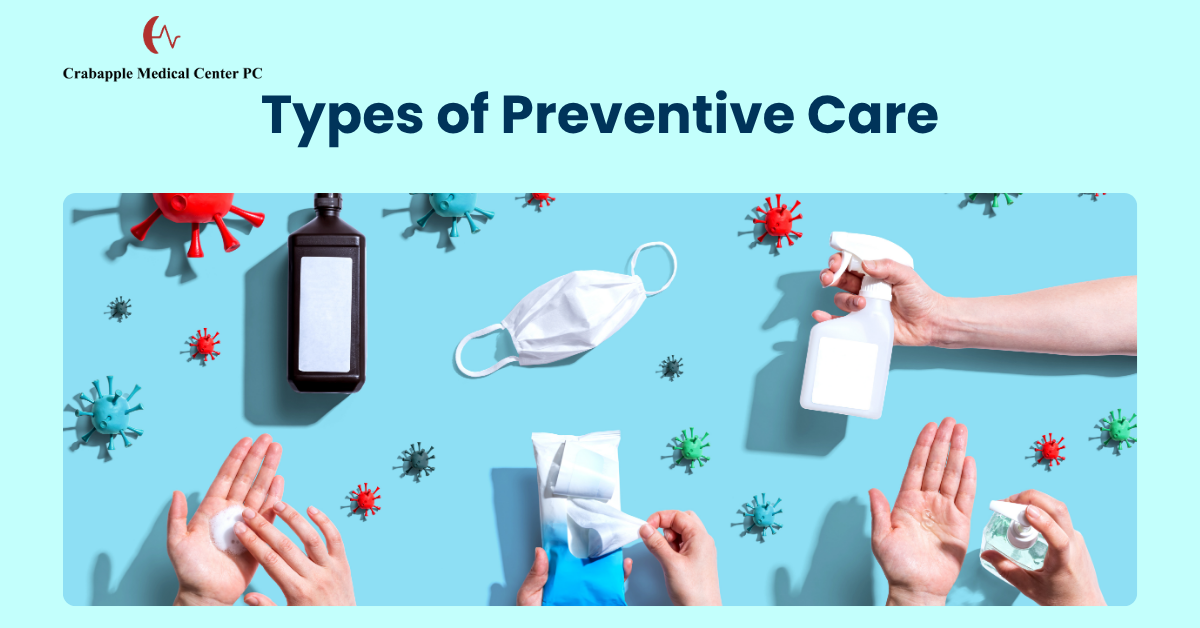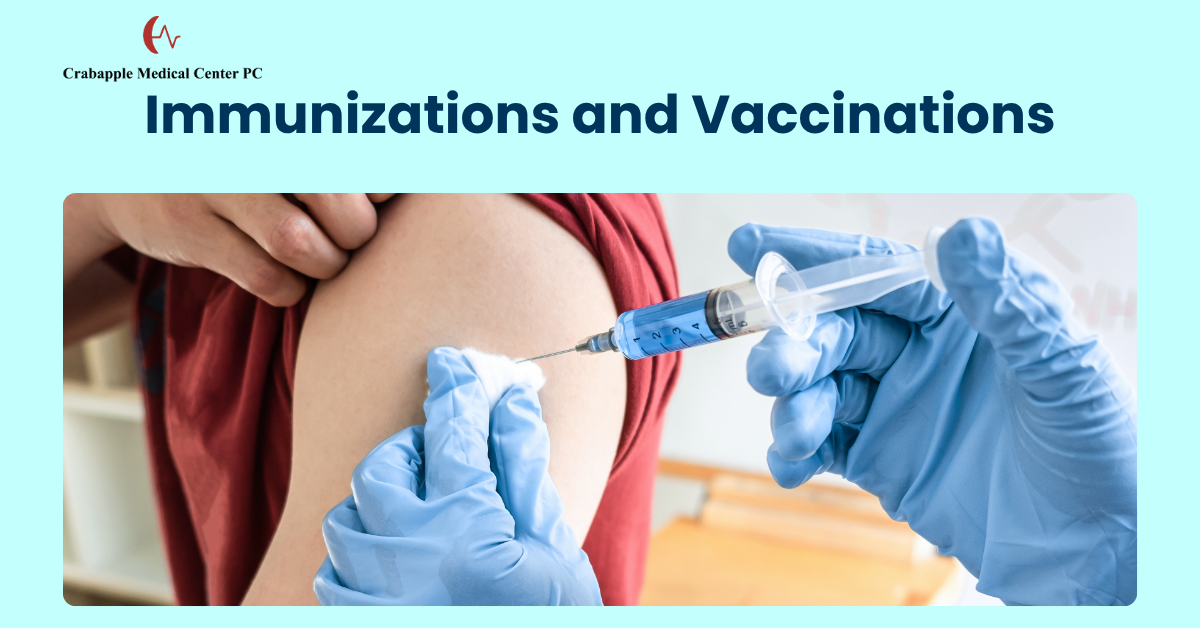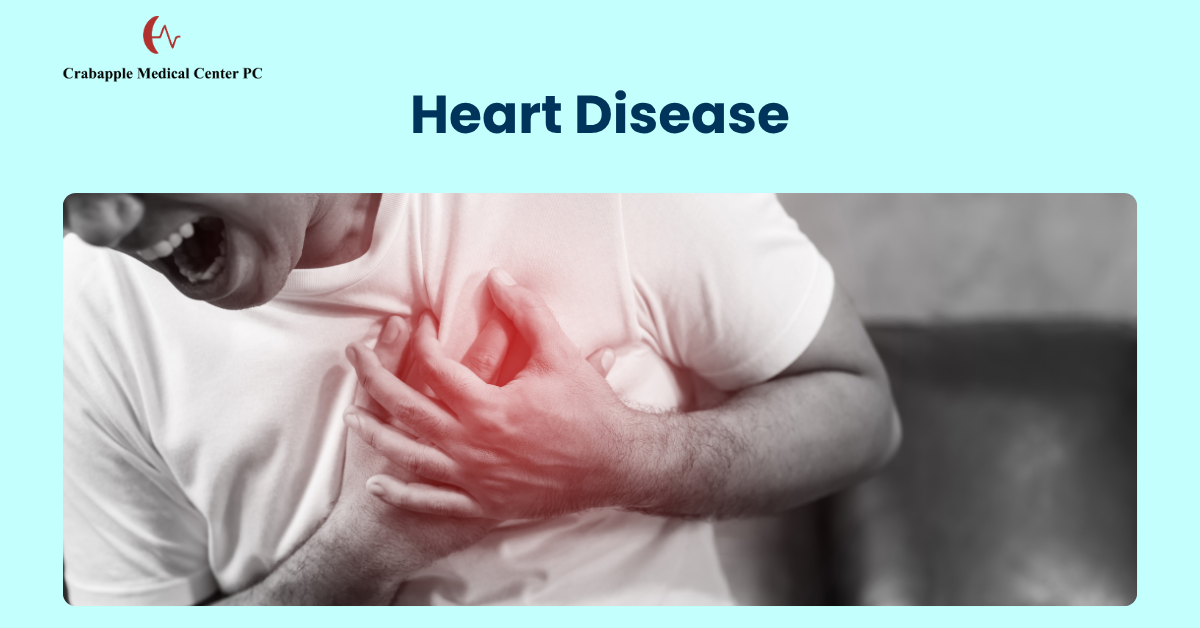Preventive Care | Your First Defense Against Chronic Diseases
In today’s fast-paced world, many people tend to overlook their health until symptoms become unbearable. However, preventive care offers a proactive approach to maintaining good health and preventing the onset of chronic diseases. With chronic conditions such as heart disease, diabetes, and cancer becoming more common, focusing on preventive care is more important than ever. Preventive care is not just about avoiding illnesses; it’s about living a healthier, longer life.
At Crabapple Medical Center in Alpharetta, GA, we believe in the power of prevention. Our dedicated team is here to help you take the necessary steps to stay ahead of health concerns and enjoy a vibrant life. We offer comprehensive preventive care services designed to address the needs of our community and provide you with the tools to manage your health proactively.
Importance of Preventive Care
Preventive care is essential because it focuses on identifying health issues before they become serious. Through regular check-ups, screenings, and lifestyle modifications, preventive care aims to reduce the incidence of chronic diseases, enhance life expectancy, and improve quality of life. But why is preventive care important?
Early Detection of Chronic Diseases
The primary benefit of preventive care is early detection. By getting regular screenings, blood tests, and exams, doctors can detect health issues in their earliest stages when they are easier and less expensive to treat. For example, routine blood pressure checks can detect high blood pressure, which is a major risk factor for heart disease. Catching this early allows for lifestyle changes or medication to manage it before it leads to a stroke or heart attack.
Early detection is particularly crucial for conditions like cancer. Breast cancer, colon cancer, and cervical cancer are among the diseases that can often be detected early with routine screenings such as mammograms, colonoscopies, and Pap smears, which significantly increase the chances of successful treatment.
Disease Prevention
Preventive care doesn’t just focus on detecting disease early; it also plays a significant role in disease prevention. By adopting healthier lifestyle choices, like regular exercise, a balanced diet, and maintaining a healthy weight, you can significantly reduce your risk for chronic conditions like type 2 diabetes, heart disease, and obesity.
Vaccinations are another key element of disease prevention. Immunizations like the flu shot, shingles vaccine, and pneumococcal vaccine help protect individuals from diseases that can lead to serious complications and even death. Preventive care also includes encouraging patients to avoid harmful habits, such as smoking and excessive alcohol consumption, both of which are known to contribute to the development of chronic diseases.
Cost Savings
Preventive care is also a cost-effective approach to healthcare. By focusing on prevention, individuals can avoid expensive treatments, surgeries, and hospital stays that would be required if chronic diseases go undiagnosed or untreated. For example, managing high blood pressure early on with lifestyle changes and medication is much more affordable than treating a heart attack or stroke. Additionally, routine screenings and vaccinations are often covered by insurance plans, making preventive care accessible to many people.
Enhanced Health and Wellness
By focusing on preventive care, you take control of your long-term health. Regular check-ups, health assessments, and lifestyle advice empower you to make informed decisions about your well-being. At Crabapple Medical Center, we offer personalized preventive care services designed to support your unique health needs, from weight management to stress reduction and beyond. These steps ensure that you maintain a high quality of life while avoiding the physical and emotional stress that comes with treating advanced illnesses.
Reducing Stress and Improving Quality of Life
Preventive care isn’t just about avoiding illness; it’s about improving your overall quality of life. Routine check-ups and health screenings can ease the stress of uncertainty and help you feel more confident about your health. Whether it’s addressing chronic conditions early or ensuring you’re up to date with vaccinations, preventive care keeps you feeling your best and minimizes the anxiety that comes from unexpected health issues.

Types of Preventive Care
Routine Check-ups :
Routine check-ups or physical exams are foundational to preventive care. These check-ups give healthcare providers the opportunity to assess a patient’s overall health, address any concerns, and catch potential issues early on. During a routine check-up, doctors may monitor blood pressure, cholesterol, blood sugar levels, and weight. They may also perform a physical exam, which includes listening to the heart and lungs, checking reflexes, and other basic health assessments.
Doctors also review a patient’s medical history, including family history, and provide advice on maintaining a healthy lifestyle. These appointments are an opportunity for patients to ask questions, address health concerns, and ensure that they are on track for maintaining a healthy life.
Screenings and Tests :
Preventive screenings are tests that help detect conditions that may not yet show symptoms but could develop into more serious issues if left undiagnosed. Common screenings include:
- Cancer Screenings: Mammograms, colonoscopies, and Pap smears are common screenings used to detect cancers at an early stage, improving the chances of successful treatment.
- Blood Tests: Routine blood tests can detect high cholesterol, diabetes, and kidney or liver problems.
- Blood Pressure Checks: High blood pressure is a major risk factor for heart disease and stroke. Regular monitoring can catch elevated blood pressure early, preventing complications.
- Vision and Hearing Tests: Regular screenings for vision and hearing loss can help detect problems that can affect your quality of life.
By scheduling these screenings as recommended, you increase the chances of early detection and successful treatment.

Immunizations and Vaccinations :
Vaccinations are one of the most effective ways to prevent diseases. Vaccines protect against diseases like flu, pneumonia, hepatitis, and shingles. For adults, the flu shot and pneumonia vaccines are highly recommended, especially for those over 65 or with compromised immune systems.
Childhood immunizations are another crucial aspect of preventive care. Vaccines protect children from diseases like measles, mumps, rubella, polio, and whooping cough. Ensuring that children are vaccinated on schedule helps protect them and the community.
Chronic Disease Management :
While preventive care is essential for avoiding diseases, it is equally important for managing chronic conditions once they develop. Chronic diseases like diabetes, heart disease, and asthma require ongoing management. Preventive care plays a critical role in monitoring these conditions and ensuring that they are well-managed to prevent complications.
For example, people with diabetes need to regularly monitor their blood sugar levels and follow a healthy diet to prevent complications like nerve damage, kidney problems, and heart disease. Patients with hypertension need to monitor their blood pressure regularly and take prescribed medications to avoid heart failure, stroke, and kidney disease.
Lifestyle Counselling :
Preventive care isn’t just about medical tests and screenings; it’s also about lifestyle changes. Healthy eating, regular exercise, stress management, and adequate sleep are all critical components of preventive health. Healthcare providers can guide patients on how to maintain a healthy weight, reduce stress, improve diet, and increase physical activity.
By adopting healthier lifestyle habits, individuals can significantly reduce their risk of developing chronic diseases such as heart disease, type 2 diabetes, and certain cancers. Lifestyle counselling is an essential part of preventive care, helping patients make long-term changes that improve their overall health.
Mental Health Care :
Mental health is often overlooked in preventive care, but it plays a significant role in overall well-being. Mental health conditions like depression, anxiety, and chronic stress can have a profound impact on physical health, leading to problems like high blood pressure, heart disease, and weakened immune function.
Preventive care involves addressing mental health concerns early on through counselling, therapy, or medication. It is essential to manage stress, anxiety, and depression to maintain both mental and physical health.
Preventive Care and Its Impact on Chronic Diseases
Chronic diseases are long-lasting conditions that often require ongoing care and management. However, many chronic diseases can be prevented, delayed, or better managed with preventive care. Let’s take a closer look at how preventive care can impact specific chronic diseases:

Heart Disease :
Heart disease is one of the leading causes of death worldwide. Regular check-ups, blood pressure monitoring, and cholesterol screenings are crucial in preventing heart disease. By managing risk factors such as high blood pressure, high cholesterol, and obesity, individuals can significantly reduce their risk of developing heart disease.
Diabetes :
Diabetes, especially type 2 diabetes, is largely preventable through lifestyle changes. Regular blood sugar screenings can detect prediabetes, allowing individuals to make necessary changes to their diet and exercise routine to prevent the onset of full-blown diabetes.
Cancer :
Preventive screenings such as mammograms, colonoscopies, and Pap smears play a significant role in detecting cancer at an early stage. By detecting cancer early, treatment can be more effective, reducing the likelihood of complications and improving survival rates.
Obesity :
Obesity is a major risk factor for several chronic diseases, including diabetes, heart disease, and certain cancers. Preventive care involves monitoring weight, offering nutrition counselling, and encouraging physical activity to help individuals maintain a healthy weight.
Stroke :
Preventive care helps reduce the risk of stroke by monitoring blood pressure, cholesterol levels, and blood sugar. Lifestyle changes such as a healthy diet, regular exercise, and quitting smoking can also significantly reduce stroke risk.
Preventive Care at Crabapple Medical Center
At Crabapple Medical Center, we are committed to helping you maintain a healthy life through comprehensive preventive care services. Our healthcare team offers routine check-ups, screenings, vaccinations, lifestyle counseling, and chronic disease management. We understand the importance of early detection and disease prevention, and our team works closely with you to develop a personalized preventive care plan that meets your specific needs.
Comprehensive Health Assessments :
We offer thorough health assessments that include routine screenings for blood pressure, cholesterol, blood sugar, and more. Our medical team will work with you to identify any health risks and develop a tailored plan to help you stay healthy and active.
Lifestyle Counselling and Support :
Our healthcare providers offer personalized lifestyle counselling to help you make lasting changes that improve your health. Whether it’s managing your weight, improving your diet, or increasing your physical activity, we are here to guide and support you every step of the way.
Vaccinations and Preventive Screenings :
We provide a wide range of vaccinations and preventive screenings, ensuring that you stay up to date on essential health checks. From flu shots to cancer screenings, we are dedicated to helping you prevent illness and catch potential issues early.
Chronic Disease Management :
For patients with chronic conditions, we offer ongoing monitoring and management to ensure that conditions like diabetes, hypertension, and heart disease are well-controlled. Our goal is to help you live a long, healthy life without the burden of preventable complications.
Preventive Care Services in Alpharetta
Preventive care is the first line of defense against chronic diseases, and it starts with small steps today for a healthier tomorrow. Whether it’s scheduling a regular checkup, adopting a healthier lifestyle, or staying up to date with vaccinations, preventive care can significantly improve your quality of life. At Crabapple Medical Center, we are committed to supporting you on your journey to better health. Don’t wait until it’s too late. Take charge of your health and schedule a preventive care appointment today.
Frequently Asked Questions (FAQs):
What preventive care services does Crabapple Medical Center offer?
At Crabapple Medical Center, we offer a wide range of preventive care services, including routine check-ups, cancer screenings (such as mammograms and colonoscopies), vaccinations (like flu and pneumonia shots), chronic disease management (for conditions like diabetes and heart disease), and health and wellness consultations.
How often should I schedule a preventive care check-up?
It’s recommended to schedule a check-up at least once a year. However, the frequency may vary depending on your age, health history, and any ongoing conditions. Our healthcare team can help you determine the best schedule for your needs.
Do I need to get vaccinations every year?
Certain vaccinations, like the flu shot, are recommended annually, while others may be needed once every few years (like the pneumonia or shingles vaccine). Our team at Crabapple Medical Center will help you stay up to date with the right vaccines based on your health profile.
Can preventive care help me avoid chronic diseases?
Yes! Preventive care plays a crucial role in reducing the risk of chronic diseases such as diabetes, heart disease, and cancer. By regularly monitoring your health, making healthy lifestyle changes, and addressing potential issues early, you can prevent or manage these conditions more effectively.
How can I schedule a preventive care appointment at Crabapple Medical Center?
You can easily schedule your preventive care appointment by calling us directly at Crabapple Medical Center or by using our online appointment booking system. Our friendly team will guide you through the process and help you find a convenient time.
How does preventive care reduce healthcare costs in the long run?
By identifying health issues early, preventive care helps prevent the need for costly treatments, surgeries, or long-term hospitalizations. Early detection often leads to more effective, affordable treatments and helps reduce the overall financial burden of healthcare.
Is preventive care only for adults, or should children also get preventive care?
Preventive care is important for individuals of all ages, including children. Regular pediatric check-ups, immunizations, and screenings are crucial for early health monitoring and ensuring a healthy future for kids.

